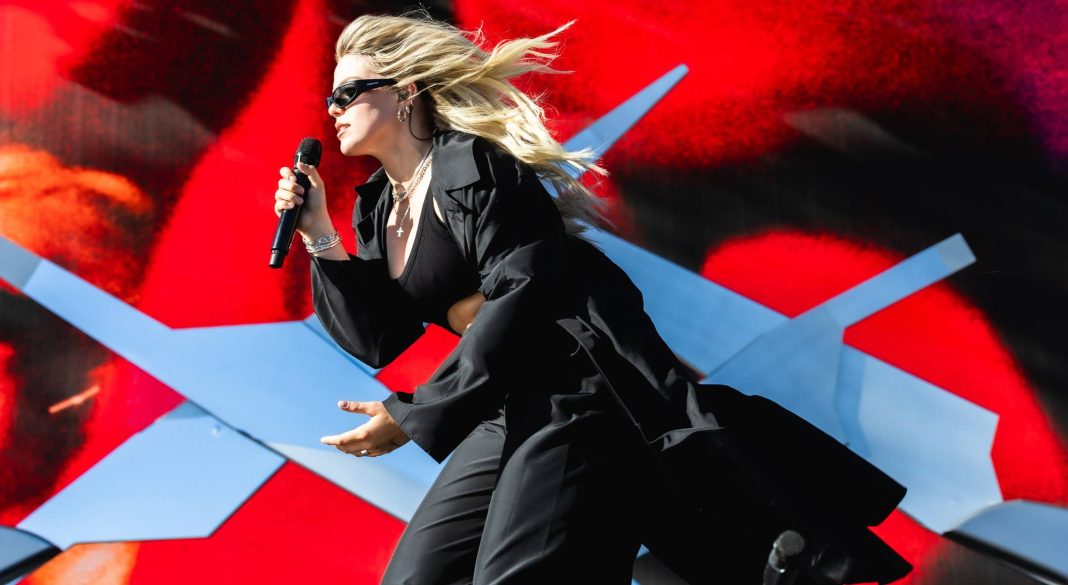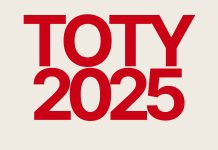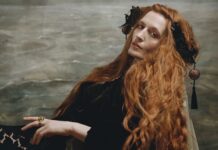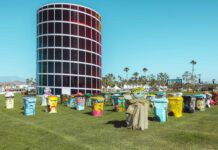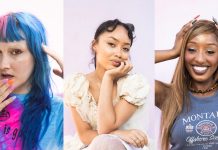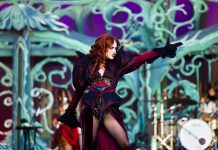Amidst all the usual internet grumbling about dull crowds, pricey food and stifling heat, there was one big rainbow-coded talking point at this year’s Coachella: the amount of open queerness that was on display. Whether it was Reneé Rapp showcasing a giant pair of scissors and being introduced by the cast of The L Word, Chappell Roan exploring drag or Victoria Monét getting up close and personal with a female dancer, the big talking sets of the weekend tended to be those which made their sexual identity pretty unapologetically clear.
Once your sapphic lens was open, there was no stopping the signs. Billie Eilish soft-launching teasers of ‘Lunch’ (a forthcoming track that appears to espouse the joys of eating out). Feverish #Gaylor excitement over Taylor Swift in a backwards baseball cap. Even K-Pop’s Le Sserafim debuted a new song (‘Hot & Fun’) with lyrics that could be interpreted as queer-friendly, nodding to a mood of sexual liberation: “I like to dance when I party / I like to kiss everybody.” From The Japanese House to Tinashe, Brittany Howard to Young Miko, 2024 truly seems like the year where lesbian and bisexual culture took over the desert.
something so interesting about the coachella this year omg pic.twitter.com/c1G5TolmGt
— be (@vanslaeken) April 15, 2024
The advent of #queerchella comes at a time when inclusion and representation for LGBTQIA+ people in music might otherwise feel pretty dour. In a recent report by Musicians Union, Help Musicians and Come Play With Me, statistics show that twice as many LGBTQ+ musicians experience work-related abuse and harassment than their straight counterparts, whilst 43% suffer from poor mental health that is at least partially related to experiences of discrimination. Nearly three-fifths reported a lack of sustainable income as a barrier in their music careers.
It’s a damning read, and yet there are signs that the climate is slowly improving at the top, particularly for femme-presenting queer women. 2023 of course belonged to boygenius and MUNA, while in 2024, Chappell Roan’s breakthrough sits alongside The Last Dinner Party as one of the most talked-about new talents, embracing theatricality and a love of drag make-up when performing her celebratory, country-inspired hits. Recently on tour with Olivia Rodrigo, you only needed to scan the Coachella crowd during her performance of ‘Pink Pony Club’ — a song about escaping suburban mindsets to chase your biggest pop fantasies — to see how deeply she is resonating.
THE RISE OF A MIDWEST PRINCESS pic.twitter.com/TPOKAfjFFd
— white jeep cherokee🧚🏻♀️ (@RangeRoan) April 15, 2024
Of course, sexually-loaded escapism has always been big pop currency, with festivals in themselves marked as an opportunity to cut loose, be your truest self and hopefully feel safe in the knowledge that music can truly unite us all. Sapphic pop cultures are nothing new, but for years, their business has mostly been in the titillation of male excitement, catering to the fantasy of girl-on-girl action. Even within mainstream pop fandoms, there has for so long been an emphasis on artists who appeal to white gay male audiences, rather than to their fellow queer young women. Queer boys got to have their Coachella fun too, of course — Lil Uzi Vert Voguing during his main stage set, Dominic Fike and Kevin Abstract actively flirting onstage — but it’s exciting to see artists who provide such open bi and lesbian representation for no other reason that the fact that it is who they are.
Coachella, おすすめに流れてきて気になったTHE LAST DINNER PARTYをみてきたら凄まじくQUEERステージで最高でこの時間になってた。 pic.twitter.com/fOBBSAGeLP
— sana (@queernessme) April 14, 2024
In a world where queer right are being steadily eroded, this kind of representation can still feel pretty pioneering, especially when delivered across intersectional lines. That Black queer women in the crowd could look to an artist like Ludmilla — who brought her wife Brunna Gonçalves on stage for a kiss after being introduced via a voice note from actual Beyoncé — is a feat of absolute inspiration, made only better by the no-nonsense terms with which she laid out her set. “In my house, I will not tolerate any kind of hatred. Racism, homophobia, xenophobia, or misogyny… Respect the most-listened [to] Black woman in Latin America.” It’s an open act of resistance, but also an understanding that queer people have always been at the cutting edge of what’s fresh and fun and exciting in music.
more sapphic content from coachella that isn’t being talked about enough https://t.co/GBvhbvHrCy
— ⋆˚࿔ KC 𝜗𝜚˚⋆ (@p1tchblack1nk) April 15, 2024
Unfortunately, all of this queer joy does come with a more sinister cultural tax. Delivered in conjunction with concert promoter Goldenvoice, Coachella is part of the Anschutz corporation, who reportedly donated $75,000 to the Republican Attorneys General Association days after Roe v. Wade was overturned. While Anschutz’s owner denied that the “owner received, saw, or was aware of the fundraising solicitation”, there are also tax receipts from 2020 which show Anschutz donating $1,020,000 to two organisations that have been outspoken in their disdain for LGBTQ people — Colorado Christian University and the Sky Ranch Christian camping organisation. In this way, many fans online have pointed out that when queer artists take the opportunity to perform at Coachella, or queer fans choose to attend, they’re inadvertently fuelling the systems that drive hostility towards their communities.
Coachella is all over my timeline and I can’t help but wonder if people know that the festival is one of the largest funders of hate against LGBTQ Americans in the county? And its owner is anti-migrant, anti-abortion, and puts his money where his heart is? pic.twitter.com/IZfCNERdkx
— Zackory Kirk (@zackoryk) April 15, 2024
Straight and cisgender audiences can of course love artists with whom they do not share sexuality or gender, but there’s also a concern amongst some fanbases that artists who are only just coming into their own public queerness may be vulnerable to too much commercialisation too soon. It’s a gatekeeping tension that has emerged at Reneé Rapp’s own concerts, where she jokingly invites straight people to ‘stay home’, or within the Chappell Roan fandom, where fans are glad to see her status grow, but are also concerned that she will be presented to audiences who don’t really ‘get’ what she stands for, who want to fetishise, minimise or abuse who she is. It’s a risk for artists from any marginalised background, but one that is highlighted in the context of Coachella’s ownership, troubling the notion that these artists can truly feel safe or even celebrated if the money they are making is directly being channelled into causes that contribute to their suffering.
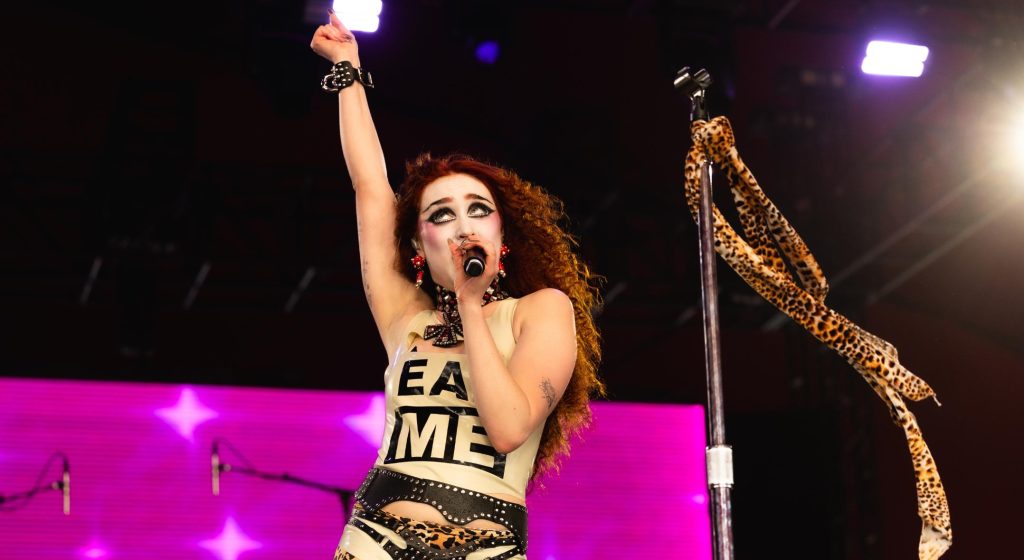
It’s a difficult conundrum that very few ambitious artists are truly immune from. Coachella remains, for better or worse, one of the most high-profile stages in the world, offering the kind of exposure that is difficult to come by elsewhere. By appearing at Coachella in spite of its Republican values, one could argue that queer performances are protesting from within, standing on the shoulders of endless other non-confirming artists who have paved the way through ballroom, hip-hop, riot grrl and so much more. By tapping into these sorts of opportunities, queer artists have the opportunity to achieve the kind of mainstream success that they deserve, but have to also find ways to stay true to the queer audiences who helped put them there.
no but seriously it feels SO GOOD being alive at the same time ppl who are publicly proud to be QUEER i mean they're at fucking coachella being openly gay that's so cool im happy sometimes https://t.co/edGmpaB1oH
— nanna (@julienlovedog) April 15, 2024
However artists choose to approach this discussion, it’ll be exciting to see these musicians bring their full selves to the rest of the festival season, and to know that for the young people watching, they could well be the kind of representation that makes them feel properly understood. If Queerchella was responsible for opening fans’ eyes to the breadth of bi and lesbian talent that there is out there, then fans deserve the opportunity to feel excited, even despite the potential concerns. In time, we can only hope that LGBTQIA+ inclusion and celebration becomes the festival norm, giving all music lovers the opportunity to see somebody they can relate to up there on the big stage.


